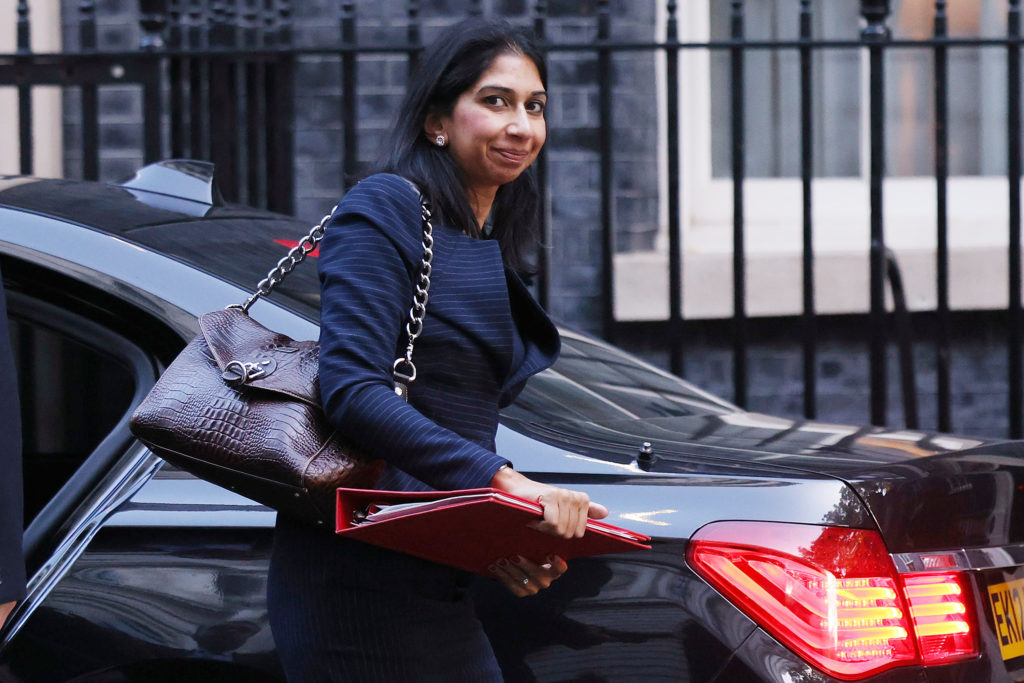LONDON — Don’t hold your breath for a U.K. visit from Indian Prime Minister Narendra Modi to seal a much-coveted trade deal with India.
New Delhi is seething over a British Cabinet minister’s comments on Indian immigration, and a key deadline now looks in doubt.
British and Indian media reported that Modi planned to visit the U.K. for the Diwali October 24 deadline set by both sides in April to conclude trade talks with his British counterpart. But those plans are no longer being pursued, two people close to the negotiations confirmed to POLITICO.
While U.K. Home Secretary Suella Braverman is supportive of a trade deal with India, she expressed “reservations” in an interview in the Spectator last week about more visa access for students and businesspeople as part of that. She accused New Delhi of not living up to the terms of a mobility pact forged last year. More leeway on migration is one of India’s key and remaining requests in the negotiations.
“Look at migration in this country — the largest group of people who overstay are Indian migrants,” the home secretary said. “We even reached an agreement with the Indian government last year to encourage and facilitate better co-operation in this regard. It has not necessarily worked very well.”
India’s High Commission in Britain shot back, calling Braverman’s comments “inappropriate” while talks continue and accused Britain of its own failures in the mobility deal meant to make it easier for students, researchers and professionals to travel between the two countries.
There is frustration within 10 Downing Street and the trade department about the impact Braverman’s comments have had on the negotiations. No. 10 has no plans for a Modi visit around Diwali.
Braverman has “damaged the political atmospherics” of the deal and public perception of the U.K. in India, a businessperson close to the talks meanwhile said, noting the home secretary’s comments “didn’t go down well at all in India.”
UK Home Secretary Suella Braverman’s comments about migration have been deemed ‘inappropriate’ | Dan Kitwood / Getty Images
The visit is “not happening,” a second businessperson, who is familiar with the workings of the Indian government, said. The October 24 deadline will be “tough” to meet, they said, adding: “I’m not sure if the entire [Free Trade Agreement] will be agreed by then.”
There are “still lots of important chapters to close [in the deal] which haven’t progressed much in the last month,” the first businessperson quoted above said, noting that doubts over the deal “are broader” than hang-ups on migration.
Long-standing concerns about access for Britain’s large services sector and access to flows of data that help deliver digital products are still unresolved.
Indian carmakers are backing a cut to the country’s high tariffs on British-made cars that would bring duties down to 30 percent, easing access to the country’s notoriously protectionist automotive markets. Yet even if the tariffs are liberalized, Britain’s automotive sector worries technical rules of origin may still pose barriers to British cars and trucks.
U.K. Trade Secretary Kemi Badenoch and the trade department “will be doing everything possible over the next fortnight to secure a good deal with India,” said a trade department official.
“The Indians are notorious negotiators and inherently protectionist,” they said, “so reaching an ambitious agreement is going to be difficult, but we are absolutely committed to finding a way through.” A spokesman for Truss said there was no change in expectations on the delivery of a deal and “complex negotiations are ongoing.”
Two-way trade between the two countries was worth £24 billion in 2021. The U.K. government hopes to grow this through a deal. A trade department spokesperson said they “won’t sacrifice quality for speed, and will only sign when we have a deal that meets both countries’ interests.”
Braverman’s office declined to comment. The Indian High Commission also declined to comment while talks are ongoing.
This article is part of POLITICO Pro
The one-stop-shop solution for policy professionals fusing the depth of POLITICO journalism with the power of technology
Exclusive, breaking scoops and insights
Customized policy intelligence platform
A high-level public affairs network





